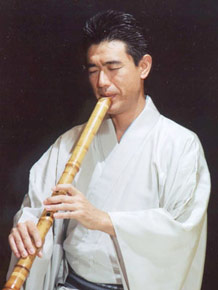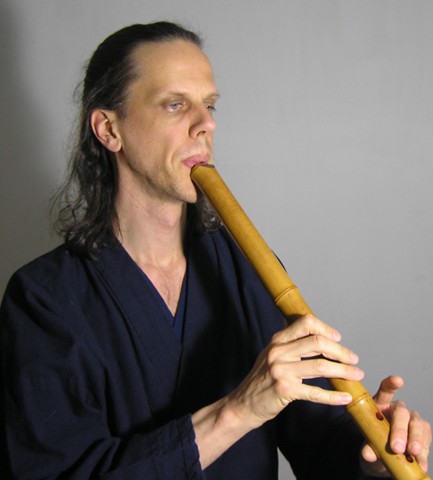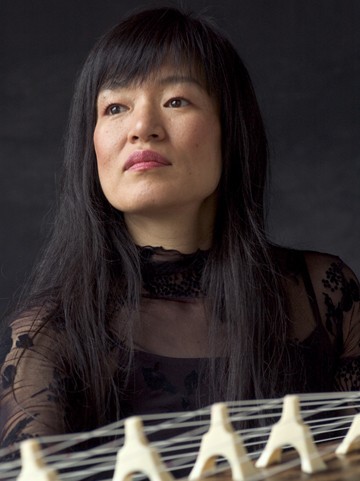
Kaoru Kakizakai was born in Chichibu, Saitama Prefecture in 1959 and started playing the kena while he was in his teens. At 21 he started playing the shakuhachi in the Kinko style. His teacher recognized an unusual ability to play so he recommended him to study with the master, Yokoyama Katsuya. He graduated from the NHK Traditional Music Conservatory and is the winner of the prestigious Kumamoto All Japan Hogaku competition. He has recorded with Yokoyama sensei on his CDs and videos and is a popular leader of shakuhachi workshops for the International Shakuhachi Training Center (Kokusai Shakuhachi Kenshukan) in Tokyo. He performed Toru Takemitsu's November Steps with the NHK Symphony Orchestra conducted by Charles Dutoit and Hiroyuki Iwaki and with the St. Petersburg Philharmonic in Russia, conducted by Akira Naito. He has performed extensively in America, Europe, Asia, and Australia and is a faculty member of the Boulder Colorado summer intensive camps as well as the Australian Shakuahchi Festivals. Currently he is a research fellow at the Tokyo College of Music, full time instructor for the International Shakuhachi Kenshukan and NHK Culture Centre, and President of the International Shakuhachi Kenshu-kan Chichibu School and Higashi Yamato School.

Peter Hill first heard the shakuhachi in early 1988 while living on Taiwan, where he was studying Chinese philosophy and taijiquan, and within six months had moved to Kyoto, Japan to begin its study. He soon met Kurahashi Yoshio, with whom he studied Kinko-ryu honkyoku, koten honkyoku, sankyoku, and minyo until 1991. He then spent a year in various parts of the Himalayas and Indonesia, travelling, trekking, and studying yoga and meditation. Upon his return to the US in 1993 he quit playing shakuhachi until 1995, when he was invited to perform on a few occasions and thereby rediscovered his love of the instrument. Thus began a five-year period of self study, following the haiku poet Basho's advice to "learn about bamboo from the bamboo" and studying the recordings of the great players, both Japanese and non-Japanese. In 1999, during a brief visit to Japan, Peter was invited to spend a weekend with the reclusive master player Taniguchi Yoshinobu, who recognized his exceptional potential as a player and strongly urged him to return to Japan for an extended period to hone his technique in the doukyoku style of Watazumi Douso and Yokoyama Katsuya. He did, and spent 2001-2004 studying with Yokoyama sensei and one of his top students, Kakizakai Kaoru, in Tokyo and Chichibu. In 2002 Peter was awarded first prize in the "Shinjin-O Shakuhachi konkuru" (New King of Shakuhachi Competition) in Tokyo, becoming the first foreign player to win such a prize, and attaining the highest score ever awarded in this competition. In the spring of 2004 he was awarded a shihan teaching license by Yokoyama sensei. He currently lives in Seattle, Washington where he is active as a shakuhachi teacher and performer.

Mitsuki is a graduate of Japan's renowned Kunitachi College of Music. Due to the strong influence of western (European) arts in Japan, curriculums are devoted almost entirely to the study of western music and theory. Consequently, Mitsuki, like most Japanese, grew up with virtually no exposure to traditional Japanese music. She entered college with the intent of pursuing western classical music, but during the course of her studies felt drawn to the non-western traditions of Eastern Europe, the Middle East, and Asia. Interests in these areas eventually led Mitsuki on a circuitous route to a discovery of traditional Japanese music and the Koto.
In 1988 she began her studies with the Sawai Koto Institute, and in 1994 she graduated with the 10th class of the intensive "Sawai Koto Seminar", with instruction by modern Koto Masters Tadao and world renowned Kazue Sawai. Even today she continues a warm friendship and advanced mentoring from the venerable Sawai.
A founding member of both the "All Sums" Koto ensemble, which has performed extensively throughout Japan since its inception in 1995, and the newly formed U.S. Koto ensemble called "Koto Phase", which has performed multiple concerts in Chicago and San Francisco, Mitsuki's musical background is both diverse and extensive as a performer and innovator. Not limiting herself to music traditionally associated with the Koto, she often incorporates western, pop and improvisational elements and arrangements, allowing her to relate the Koto's appeal to a variety of audiences. She also has several compositions of her own inspiration to her credit and having earned respect as a personable and uniquely skilled cultural performer in the Northwest, is increasingly being sponsored by the Japanese Consulate-General of Portland, OR.